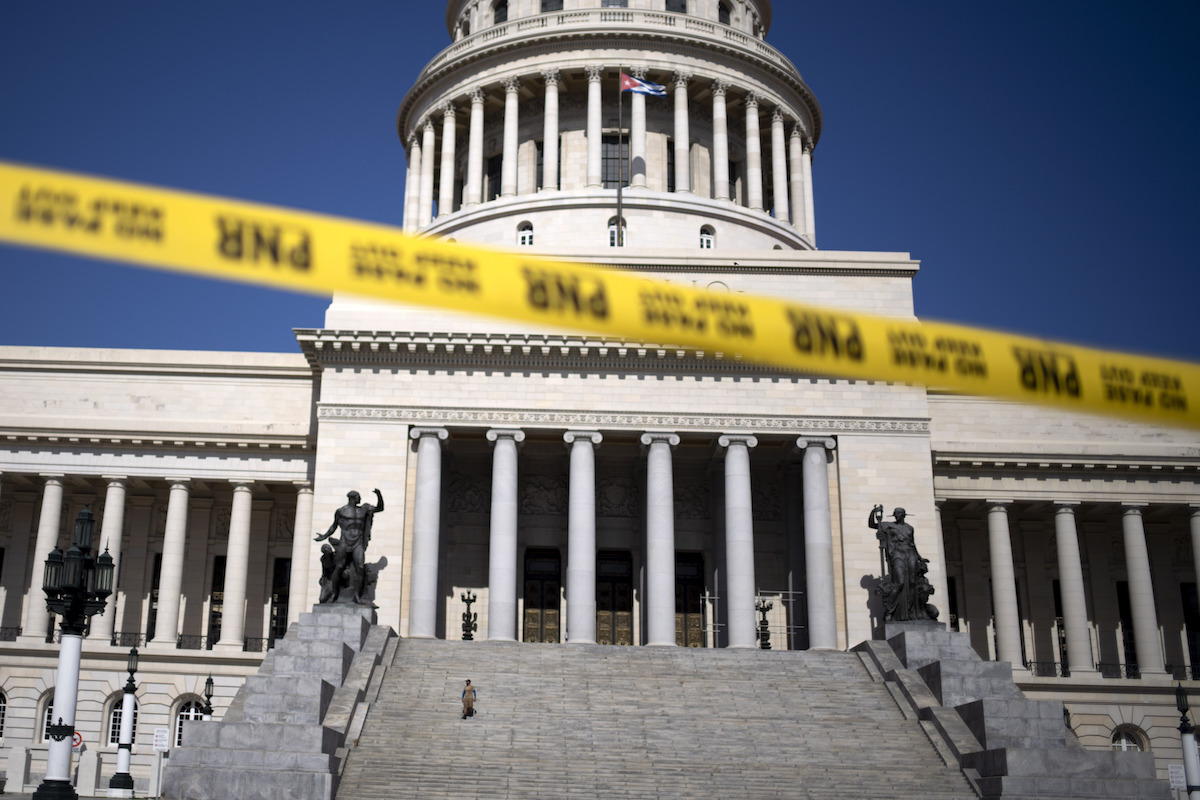

Caution tape blocks the street at the entrance of the National Capitol building in Havana, Cuba, Tuesday, July 13, 2021. (AP Photo/Eliana Aponte)
An old beacon for Central American leftist revolutionaries and a lasting symbol of Cold War proxy battles, Cuba faces its biggest internal protest movement in decades. Amid chronic food and medicine shortages, a suffocating U.S. embargo, and decades of authoritarian rule, thousands of Cubans have taken to the streets in the past week chanting Patria y Vida, or Homeland and Life.
At the height of Latin America’s so-called “Pink Tide,” the rise of socialist governments following the end of the Cold War, many Central American leaders would have been eager to weigh in on a disruption to the island’s politics. But so far only Nicaraguan President Daniel Ortega has commented on the protests.
“It’s mainly due to each ruler’s lack of interest in legitimizing the protests, knowing that they might face the same situation, like Guatemala’s Giammattei and Hernández in Honduras,” Tiziano Breda, Central America analyst with International Crisis Group, told El Faro English. Governments may also be wary, he added, of “contradicting the position of the United States, their main partner.”
For Salvadoran President Nayib Bukele, who as a candidate in 2019 denounced authoritarianism in Venezuela, Honduras, and Nicaragua, speaking out now could contradict his own recent actions. “He can’t fight for democracy,” said Rubén Zamora, prominent retired leftist politician in El Salvador and former ambassador to the United States. Citing recent attacks on political dissent as evidence of deteriorating democracy in El Salvador, he said >Bukele is “doing the same [as the Cuban government], or at least walking that same path.”
Right-wing Guatemalan President Alejandro Giammattei has often wagged his finger at the Maduro government in Venezuela, and even tried to visit opposition leaders there shortly after being elected in 2019, but was denied entry to the country. But, according to Carlos Menocal, Guatemalan political analyst and former interior minister, for his own personal interests, Giammattei is biting his tongue amid the protests in Cuba.
“He’d love to applaud because he’s anti-communist, right-wing, and neoliberal,” Menocal told El Faro English. Giammattei recently called a state of emergency in response to protests against his handling of the pandemic. “But on the other hand if he applauds, he’d be encouraging the Guatemalan population that’s protesting to keep doing so.”
In Honduras, where the government often violently suppresses protests, official condemnations of the Cuban government would also sound alarms. “On what grounds can we Hondurans criticize a regime like Cuba when we’re so far from democracy?” asked economist Julio Raudales. He added that the Hernández government is “too busy with their own problems” —like drug trafficking allegations against Hernández and the potential consequences if he loses presidential immunity if he leaves office next year— to comment on Cuba.
Honduran leftist party Libre hasn’t commented on Cuba either. Doing so could harm their aspirations in the November presidential race, explained Raudales. Other leftist politicians in the region have taken a different tack.
In El Salvador, the left-wing FMLN, long an ally of the Cuban government, spoke out against the protests on Sunday. The party said in an official statement: “Cuba is not alone in its fight in the defense of dignity, sovereignty, its people, and its revolution.”
The FMLN statement is “counterproductive” for its domestic opposition strategy, according to Breda. “They’re contradicting their position internally in which they call for greater U.S. and international pressure to reign in Bukele’s authoritarian traits,” he said. The FMLN won only four seats in the February elections—the smallest number since it converted from a guerrilla movement into a political party in 1992.
Nicaragua’s Ortega, whose ties to the Cuban regime date to the 1960s, when Fidel Castro trained the Sandinistas, has been the most vocal politician in the region, asserting on Monday that the protests are a form of destabilization by the United States. That same day, the U.S. State Department imposed visa restrictions on 100 Ortega-aligned public figures, including politicians, judges, and prosecutors.
Some long-time leftists say that old regional alliances and unwavering support for the Cuban regime are cracking.
“Many on the left still defend the Cuban government to death, but more of us are dissidents,” said Rodolfo Pastor, Honduran historian, member of the Libre Party and former culture minister. Continuing to defend the Cuban government without recognizing its errors is a mistake by leftists in the region, he asserted.
Bernardo Arévalo de León, of the Guatemalan Movimiento Semilla party, condemned the repression of protesters in Cuba. “As a progressive party, we have a commitment to the objectives of liberty and equality,” he told El Faro English. “We don’t think that the use of authoritarian tools is justified by the ideological purpose of the government that uses them.”
The unrest in Cuba echoes frustrations in Central America, where citizens are fed up with the inequality and corruption—both rising during the pandemic.
“Leaders should listen to the legitimate demands of the population,” said Menocal, the Guatemalan analyst. “They should be sensitive to these demands and provide immediate responses to these citizen complaints.”
Thanks for reading. If you’ve learned from our work, consider supporting independent journalism in Central America, for the price of a coffee a month, at support.elfaro.net.


